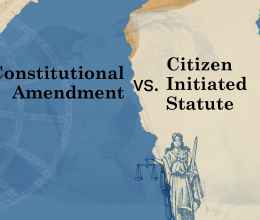Why is Criminal Rule 46 important? Criminal Rule 46 is the Rule of Practice and Procedure that provides all state courts with instructions regarding bail-setting procedures. This Rule therefore has the opportunity to implement bail reform across the state of Ohio. It could also choose to allow current practices to continue. Currently in Ohio, we have a two-tiered system of justice in which those who can afford their financial conditions of release go home, and those who cannot are often forced to stay in jail. We cannot allow this system to continue, and Criminal Rule 46 is one of the ways we can get the change we need. What is a Rule of Practice and Procedure? As the name suggests, Rules of Practice & Procedure govern the practice and procedures of all state courts in Ohio. These Rules include the Rules of Evidence, Rules of Juvenile Procedure, Rules of Appellate Procedure, Rules of Criminal Procedure and Rules of Civil Procedure. Criminal Rule 46 is part of the Rules of Criminal Procedure. How are Rules of Practice and Procedure created and adopted? This is a multi-step process, we broke it down here:
- Recommendations: The Supreme Court of Ohio's Commission on the Rules of Practice and Procedure Reviews all rules, receives and considers proposed rules and amendments, and recommends rules and amendments for adoption by the Court.
- Comments: It is standard practice that when considering amendments to Rules of Practice & Procedure, the Supreme Court of Ohio publishes the proposed amendments for public comment.
- Review: The Commission and the Court then review the comments and determine what amendments they want to file with the General Assembly.
- General Assembly: The Ohio Constitution requires that all Rules of Practice & Procedure be filed by the Court with the General Assembly on or before January 15th. The General Assembly then has the opportunity to publish the proposed amendments for public comment again, hold committee hearings, or submit its own recommendations to the Court. Or, it could do nothing.
- Back to to the Supreme Court of Ohio: The Commission and Court will then once again review the comments received. On or before May 1st, the Supreme Court is required to file any revised amendments with the General Assembly.
- Back to the General Assembly: The General Assembly has the opportunity to disapprove of the amendments.
- Effective Date: If the General Assembly does not disapprove of the amendments, they become effective on July 1st of the year.
Where are we in the Rule adoption process? Comments to the proposed amendments to Criminal Rule 46 close on November 6th. Next, the Commission and the Supreme Court of Ohio will review the comments and make changes as they see fit. Next, if they choose to move forward with the amendments, they will submit them to the General Assembly for their first review. Do Rules of Practice & Procedure have the power of law? Yes! If a previous law is in conflict with a new Rule of Practice & Procedure, the Rule trumps the law. However, a subsequent law can trump a previous Rule. (Rules of Superintendence, a different type of rule created by the Supreme Court of Ohio, do not have the power of law. But Criminal Rule 46 is a Rule of Practice & Procedure, so it does have the power of law.) Can we go over “bail” terminology?
- Personal Bond (aka personal recognizance): A written promise to appear for future court dates. This type of bond is NOT backed by money.
- Secured Bond: Money that the accused or another individual pays upfront as a security for one's promise to appear at future court dates. There are different types of secured bonds.
- Full Cash bond: When the full amount of the bond is paid prior to release.
- 10% bond: When 10% of the whole money bond amount is due prior to release.
- Surety Bond: Typically, when a bail bond agent posts bond in return for a 10% nonrefundable fee.
- Property Bond: When the accused pledges the title to the real property prior to release.
- Unsecured Bond: A written promise to appear for future court dates that is backed by money that is not paid upfront. However, the bond amount will be due if the accused fails to appear or comply with conditions of release.
What does the ACLU of Ohio’s comment on the proposed amendments to Criminal Rule 46 recommend? Each of the recommendations included in our comment are responsive to the goal of ensuring that no individual is detained simply because they cannot afford their conditions of release. Below, we have provided a summary of our recommendations. What specifically did we ask for? See below for some of the recommendations our comment included.
- We need a clear definition of “bail”: The word “bail” continues to be wrongfully conflated with “financial conditions of release.” We have asked that Criminal Rule 46 include a clear definition and purpose of “bail.”
- We need a strong presumption of release on personal recognizance and against financial conditions: While the proposed amendments have added favorable language, such as requiring that each condition of release to be the “least restrictive,” the amendments do not provide for a presumption of release, nor do they have a presumption against the imposition of financial conditions of release. Without these presumptions, we do not believe courts will change their current bail-setting practices. Liberty is supposed to be the norm for accused individuals, and this Rule should reflect that.
- We need ability-to-pay determinations: Judges should be required to make an on-the-record ability-to-pay determination before setting a financial condition of release. If a judge does not make an inquiry into the finances of the accused individual, the judge will be unable to determine what bond amount will act as an incentive for appearance versus what is likely to lead to unnecessary detention. An ability-to-pay determination requirement would also stop the unconstitutional practice of detaining individuals by setting egregiously high financial conditions of bail.
- We need the Supreme Court of Ohio to eliminate the cost of “non-financial” conditions: The current proposed amendments differentiate between financial and non-financial conditions of release. Non-financial conditions of release, according to the rule, include GPS monitoring, and drug treatment. While listed as non-financial conditions, across Ohio, some jurisdictions force pretrial individuals to pay for these types of services. If someone is unable to pay for their services, they can be sent back to jail. We strongly urge the Supreme Court of Ohio to specify that the cost of pretrial services and conditions of release must never be borne by the accused individual.
- We need a right to counsel at all stages during which bail is set: The proposed amendments allow for the continued denial of counsel at the first hearing at which conditions of release are set. Bail-setting is a critical stage of prosecution and individuals should have a right to counsel at all stages during which bail is set.
- We need written findings on the record: Judges should be required to make written findings on the record for their conditions of release decisions. If a judge does not have to demonstrate how or why a condition is “least restrictive” and why it is necessary to assure stated goals, then the courts are unlikely to change current bail-setting practices.
- The Supreme Court of Ohio should better define public safety: The proposed amendments require that conditions of bail be set to protect “the safety of any person or the community.” This is too broad and as a result, it lacks guidance. Because it is not clear what constitutes safety, a judge could use the vague language as cover to set restrictive conditions. The court should be required to make findings regarding the safety of a specific person, persons, or organization.
- The Supreme Court of Ohio should get rid of bond schedules: We remain staunchly opposed to bond schedules. They allow for no individual consideration, and as a result, allow those who can afford bond to go home, and keep those without deep pockets in jail unnecessarily.
- We need bail forfeiture protections: The proposed amendments allow for financial bonds to be forfeited after the first failure to appear. However, this does not take into consideration real-life obstacles that may thwart good-faith efforts to appear or comply with conditions. We encourage the Supreme Court of Ohio to adopt a mechanism by which individuals can appeal their bail forfeiture.






